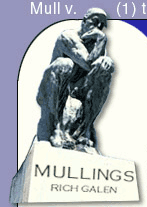
|
|
|
Is It March Already?
* The Presidential Work-Release Program in Park City, Utah seems to be going well. The Associated Press notes, in a backhanded slap, that while the President is catching up on his reading this vacation, "Last year, the president strolled Park City's Main Street, shaking hands and visiting the historic jail."
* The most telling point regarding the Juanita Broaddrick story on the Sunday talk shows was this: Every Democrat started his or her defense of Bill Clinton by saying, "We don't know if this is true or not," or (as Samuel Johnson once said) words to a like effect. One might have hoped that if our President were accused of rape, 20 years ago or 20 minutes ago, the nation's first response would be, "Oh, that's just crazy," not "We don't know if this is true or not."
* The California Republican Party disappointed most observers by not having a riot between the moderates and the conservatives during their state convention this past weekend. There was a spirited fight for control, but there was a minimum of personal attacks between the contestants. According to Rick Berke's piece this morning in the NY Times, a major reason the California Republican Party got along as well as it did was due to the influence of the Governor of Texas who, by the way, wasn't even there.
* The Republican party does best in years like this when there are a group of candidates, of varying stature, all of whom have a fair shot at the nomination. As they drop out their supporters tend to look for the person remaining in the hunt who most closely reflects their beliefs. In the end we come down to someone who will clearly be the nominee, around whom a huge percentage of the GOP will rally.
* This is in contrast to those years when there have been only two candidates. The party split into opposing camps sniping at each other straight through the Party convention, the election and well into the next year. Republicans in Iowa, for instance, have STILL not gotten over the Ford-Reagan fight of 1976.
* The Bush-for-President campaign, which hasn't even officially started, has some obvious hazards in front of it. First of all, no trainer has ever told his jockey at the Kentucky Derby to break in front and stay there all the way around. It's too hard to lead the race from start to finish.
* Second, there is a growing mountain of expectation being heaped upon Governor Bush's shoulders. It may be that Bush is to the 2000 campaign what the "six-year-rule" was to the campaign of 1998. We may be asking too much.
* Third, there are a number of candidates who have proven they have significant staying power and stature in their own right: Dole - who has been a Cabinet Secretary not once but twice; Quayle - who was a Congressman at age 27, a Senator at age 33 and Vice President at 42 is no slouch when it comes to electoral politics; McCain - whose status as a war hero is unassailable and who has been elected to the House and the Senate are probably the big three.
* Nonetheless, it will probably be Governor Bush who ignites, excites, and reunites the Republican Party. (Hey, the first slogan of 2000!) It will be up to the rest of the field to take a cue from California: Take your best shot, but when if and when it becomes obvious you can't win, get on the team.
|
